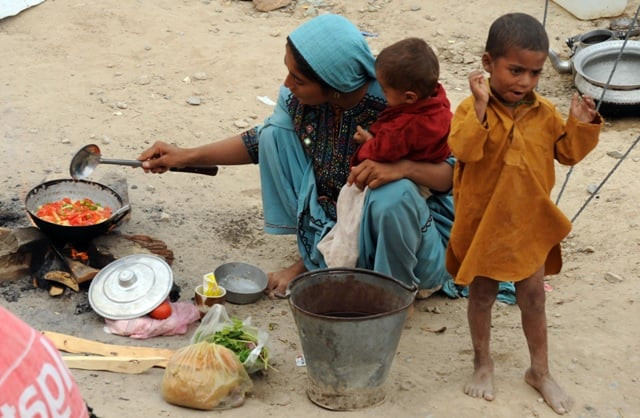Food security: Local, foreign experts laud govt's National Zero Hunger plan
Experts warn food inflation could pose major challenge in coming years, more than half of population food insecure.

The seminar was organised to address the critical question of food security and to view the government’s National Zero Hunger Action Plan (NZHAP) in this context.
The NZHAP is a government initiative to address the problem of food insecurity facing the country, including hunger and malnutrition. The $16 billion five year plan aims to reach out to almost 61 million people across the country.
Siblot lauded the initiative, saying that the program reflects a very high level of commitment towards addressing the problem of hunger and malnutrition in Pakistan.
Other experts at the seminar also appreciated the initiative. They opined that the plan was very timely, urging its swift implementation.
The participants were informed that the program includes provision of nutritious and fortified food commodities to the most food insecure and vulnerable sections of society particularly malnourished children, pregnant women and primary school children. The program also features a school feed programme and establishment of ‘zero hunger shops’ in 45 extremely food insecure districts of Pakistan.
Speaking at the event, Dr Chaudhry Inayat of Ministry of National Food Security and Research giving details of the plan said it envisioned a prosperous and hunger free Pakistan with food security for every household. The seven components of the plan include policy reforms, establishment of a National Food Security Council, targeted social safety nets, capacity building of the ministry and partnership with international agencies.
The NZHAP, drafted after rigorous consultations with various stake holders, takes in consideration the different dimensions of food insecurity in Pakistan and the steps to be taken to address the problem.
Kevin Gallagher, Country Representative, United Nations Food and Agriculture Organisation (FAO), speaking at the seminar, said that the Zero Hunger Plan was in compliance with the governments ‘right to food’ obligation, which entails provision of nutritious food for everyone.
“It would provide opportunities to vulnerable people who also place conditional obligation on them to secure food by their own” he said.
Silvia, a UNICEF representative, said that it was alarming to see the stagnant figures of malnutrition in the country. Rates of chronic malnutrition were as high as 50 per cent and that a third of children born in Pakistan were underweight.
“The problem is not with the children but with mothers who do not meet their nutritional needs during pregnancy,” she informed.
Pakistan with its low production and increasing prices of seeds and fertilisers was also one of the factors affecting the quality of food purchased.
Dr Abid Qaiyum Suleri, Executive Director, SDPI said that it was high time the government took notice of this issue. Food inflation would be a great challenge in coming years, he warned. “More than half of Pakistan’s population is food insecure, anaemic and malnourished,” he said, quoting a study by the Department for International Development (DFID) which revealed that the economic cost of iodine and vitamin deficiency in Pakistan equals to 2.5 per cent of GDP.
Talking about the challenges the Zero Hunger Plan could face, Suleri said that the most immediate challenges Pakistan could face in the programmes implementation were related to governance, institutional arrangements, division of responsibilities between federation and provinces and pilferages and mobilisation of resources.
He added that Pakistan could learn from success stories such as Brazil, Indonesia and Mexico where these programmes were running successfully.



















COMMENTS
Comments are moderated and generally will be posted if they are on-topic and not abusive.
For more information, please see our Comments FAQ